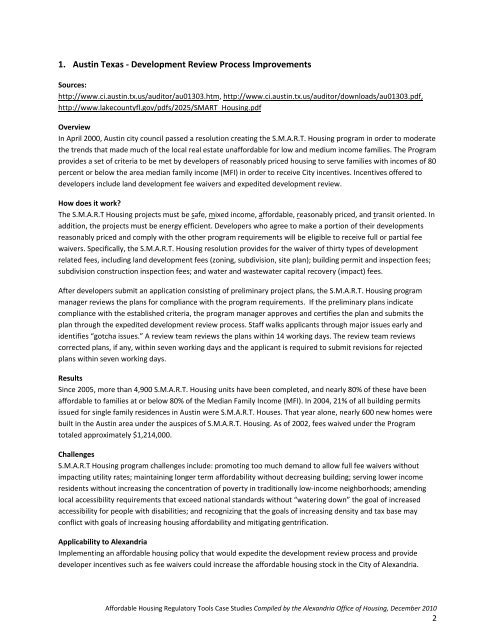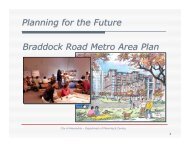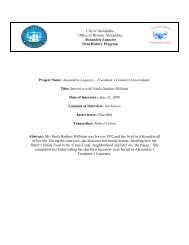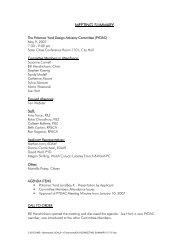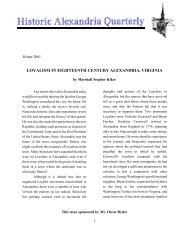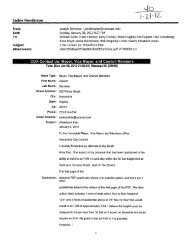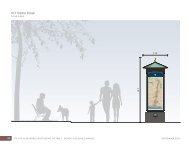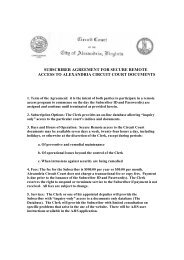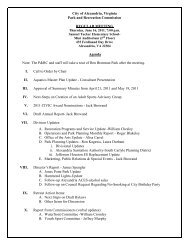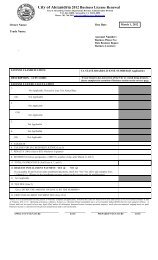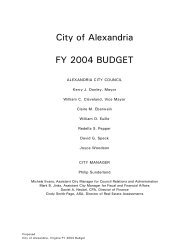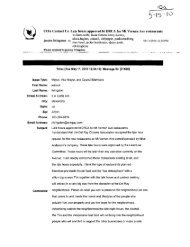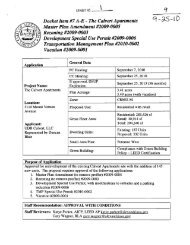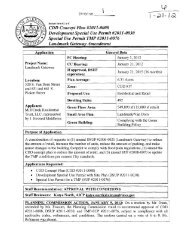Case Studies - Affordable Housing Regulatory ... - City of Alexandria
Case Studies - Affordable Housing Regulatory ... - City of Alexandria
Case Studies - Affordable Housing Regulatory ... - City of Alexandria
Create successful ePaper yourself
Turn your PDF publications into a flip-book with our unique Google optimized e-Paper software.
1. Austin Texas ‐ Development Review Process Improvements<br />
Sources:<br />
http://www.ci.austin.tx.us/auditor/au01303.htm, http://www.ci.austin.tx.us/auditor/downloads/au01303.pdf,<br />
http://www.lakecountyfl.gov/pdfs/2025/SMART_<strong>Housing</strong>.pdf<br />
Overview<br />
In April 2000, Austin city council passed a resolution creating the S.M.A.R.T. <strong>Housing</strong> program in order to moderate<br />
the trends that made much <strong>of</strong> the local real estate unaffordable for low and medium income families. The Program<br />
provides a set <strong>of</strong> criteria to be met by developers <strong>of</strong> reasonably priced housing to serve families with incomes <strong>of</strong> 80<br />
percent or below the area median family income (MFI) in order to receive <strong>City</strong> incentives. Incentives <strong>of</strong>fered to<br />
developers include land development fee waivers and expedited development review.<br />
How does it work?<br />
The S.M.A.R.T <strong>Housing</strong> projects must be safe, mixed income, affordable, reasonably priced, and transit oriented. In<br />
addition, the projects must be energy efficient. Developers who agree to make a portion <strong>of</strong> their developments<br />
reasonably priced and comply with the other program requirements will be eligible to receive full or partial fee<br />
waivers. Specifically, the S.M.A.R.T. <strong>Housing</strong> resolution provides for the waiver <strong>of</strong> thirty types <strong>of</strong> development<br />
related fees, including land development fees (zoning, subdivision, site plan); building permit and inspection fees;<br />
subdivision construction inspection fees; and water and wastewater capital recovery (impact) fees.<br />
After developers submit an application consisting <strong>of</strong> preliminary project plans, the S.M.A.R.T. <strong>Housing</strong> program<br />
manager reviews the plans for compliance with the program requirements. If the preliminary plans indicate<br />
compliance with the established criteria, the program manager approves and certifies the plan and submits the<br />
plan through the expedited development review process. Staff walks applicants through major issues early and<br />
identifies “gotcha issues.” A review team reviews the plans within 14 working days. The review team reviews<br />
corrected plans, if any, within seven working days and the applicant is required to submit revisions for rejected<br />
plans within seven working days.<br />
Results<br />
Since 2005, more than 4,900 S.M.A.R.T. <strong>Housing</strong> units have been completed, and nearly 80% <strong>of</strong> these have been<br />
affordable to families at or below 80% <strong>of</strong> the Median Family Income (MFI). In 2004, 21% <strong>of</strong> all building permits<br />
issued for single family residences in Austin were S.M.A.R.T. Houses. That year alone, nearly 600 new homes were<br />
built in the Austin area under the auspices <strong>of</strong> S.M.A.R.T. <strong>Housing</strong>. As <strong>of</strong> 2002, fees waived under the Program<br />
totaled approximately $1,214,000.<br />
Challenges<br />
S.M.A.R.T <strong>Housing</strong> program challenges include: promoting too much demand to allow full fee waivers without<br />
impacting utility rates; maintaining longer term affordability without decreasing building; serving lower income<br />
residents without increasing the concentration <strong>of</strong> poverty in traditionally low‐income neighborhoods; amending<br />
local accessibility requirements that exceed national standards without “watering down” the goal <strong>of</strong> increased<br />
accessibility for people with disabilities; and recognizing that the goals <strong>of</strong> increasing density and tax base may<br />
conflict with goals <strong>of</strong> increasing housing affordability and mitigating gentrification.<br />
Applicability to <strong>Alexandria</strong><br />
Implementing an affordable housing policy that would expedite the development review process and provide<br />
developer incentives such as fee waivers could increase the affordable housing stock in the <strong>City</strong> <strong>of</strong> <strong>Alexandria</strong>.<br />
<strong>Affordable</strong> <strong>Housing</strong> <strong>Regulatory</strong> Tools <strong>Case</strong> <strong>Studies</strong> Compiled by the <strong>Alexandria</strong> Office <strong>of</strong> <strong>Housing</strong>, December 2010<br />
2


